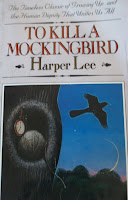A wonderful, even magical, attribute of reading is that each
individual’s reading experience is unique.
As English novelist Angela Carter states, “Reading a book is like re-writing it for yourself. You bring to a novel, anything you read, all
your experience of the world. You bring
your history and you read it in your own time.” Every reading experience is
unique to the individual, dependent on each individual’s unique life
experiences. In the same way, I believe
no individual reads a text the same way twice.
Even if an individual has read a text before, revisiting the text with
new life experiences creates a new perspective, a new lens, through which the
reader absorbs the text in a new way. I
found this true as I read “To Kill a Mockingbird” for the third time. Even though I had enjoyed the novel in my
past readings, the life events I experienced between my last reading and now
enabled me to approach the text with a new perspective, gaining insight from
new passages and finding myself drawn to parts of the novel I previously regarded
as inconsequential or irrelevant.
“‘Things haven’t
caught up with this one’s instinct yet.
Let him get a little older and he won’t get sick and cry. Maybe things’ll strike him as being---not
quite right, say, but he won’t cry, not when he gets a few years on him…Cry
about the simple hell people give other people---without even thinking. Cry about the hell white people give colored
folks, without even stopping to think that they’re people, too” (p.201). Embedded in a passage of dialogue between Mr.
Dolphus Raymond, Dill, and Scout, these lines of text present an intriguing
question concerning the “coming-of-age” experience. Dill, presented in the text as young and
somewhat naïve concerning the workings of Maycomb court, cannot understand why
the town prosecutor, Mr. Gilmer, treats the black defendant Tom Robinson
condescendingly. Dill’s frustration and unbelief
boils into tears. Scout attempts to dry these tears through an explanation that
Mr. Gilmer’s behavior is accepted because it is the way whites have always treated
blacks in the town, it is simply the way things are.
While Scout cannot understand Dill’s confusion, Mr. Raymond,
a man known for his fraternization with the black community and his drinking,
understands the inability of the innocent to accept racial discrimination and
hate. Mr. Raymond suggests that Dill’s
inability to accept the mistreatment of Tom Robinson stems from an innocent
nature. Dill’s innocent instinct does
not understand societal expectations, behaviors deemed “acceptable” due to
tradition, blind tolerance justified by convention; instead, his innocence
leads him to view hate as hate, evil as evil, and cruelty as cruelty regardless
of the practices and laws adopted by a corrupted a society. Mr. Raymond recognizes Dill’s current state
of innate innocence as a temporary stage, in which he can live guided by only conscience,
untouched and uncorrupted by the knowledge and philosophies indidvuals acquire
with age. Once Dill reaches a certain
age, his fury with hate and puzzlement over racism will fade; the society he
will grow up in will teach that hate and racism are accepted social norms. After years of observation, Mr. Raymond knows
that eventually Dill will stop asking “why”, allowing himself to “come of age”
and accept the present conditions as merely “the way things are”. As he encounters racism and hate, Dill’s
tears will no longer fall, for who cries at something that is expected and
accepted?
In this passage, Mr. Raymond suggests that “coming of age”
is an abandonment of innocence, a surrender of independent thought and emotion
and acceptance of the world in its current condition. Mr. Raymond, married to a black woman and the
father of children of mixed race, obviously lacks the racial prejudice and hate
that is commonplace in Maycomb; however, his “coming of age” taught him to
accept the racism around him and hide his beliefs in a paper sack of
whiskey. Rather than crying at the hate
and racism, Mr. Raymond lives a charade, hiding behind alleged drunkenness to
explain his incompatibility with Maycomb’s racist expectations. Rather than fighting what he knows is wrong,
life has taught Mr. Raymond to accept his corrupt world for what it is. Once, Mr. Raymond probably cried the same tears
as Dill; however, time and age dried these tears into a mask of tolerance.
There is no doubt in my mind that “coming of age” involves a
loss of innocence. Life strips indidvuals
of ignorant bliss and confronts them with cruel, cold facts of reality. However, in order to “come of age”, must one
accept these facts as valid and reasonable.
When confronted with the world’s hate, must one simply accept this hate
as a natural occurrence, an aspect of reality to be accepted and never challenged? Certainly, this question is food for thought
as one explores his or her own “coming of age” journey.



